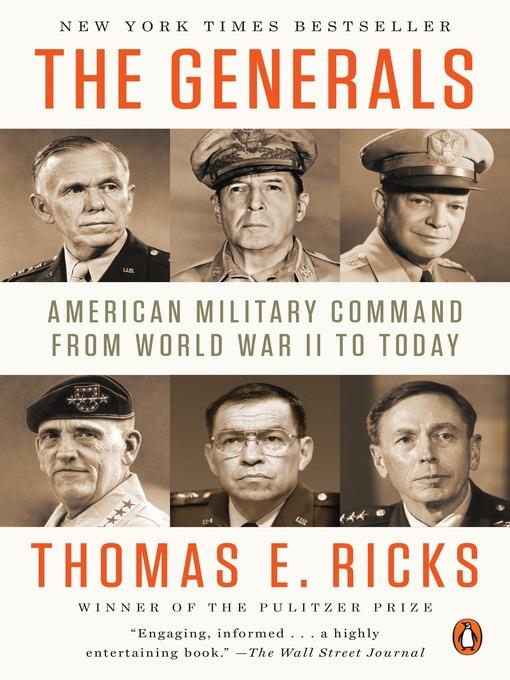
The Generals
American Military Command from World War II to Today
کتاب های مرتبط
- اطلاعات
- نقد و بررسی
- دیدگاه کاربران
نقد و بررسی

Starred review from August 20, 2012
Generations of inept, thoughtless, and unaccountable generals have authored disaster, according to this savvy study of leadership in the U. S. Army. Veteran defense journalist and bestselling author Ricks (Fiasco) contrasts the army of WWII, in which unsuccessful generals were often relieved of command, with later eras, in which officers were untouchable despite epic failures (few generals were relieved during the Iraq War, he notes). Nowadays, Ricks contends, citing an officer in Iraq, a private who loses his rifle, is punished more than a general who lost his part of a war." Combining lucid historical analysis, acid-etched portraits of generals from "troublesome blowhard" Douglas MacArthur to "two-time loser" Tommy Franks, and shrewd postmortems of military failures and pointless slaughters such as My Lai, the author demonstrates how everything from strategic doctrine to personnel policies create a mediocre, rigid, morally derelict army leadership. Ricks's preoccupation is America's difficulty coping with guerilla wars from Vietnam to Iraq, and the flip side of his critique of bad leadership is a belief that good officers with innovative, politically adroit counter-insurgency tactics might have won those conflicts. His faith in the ability of great generalship to redeem any misadventure can sometimes seem naïve. Still, Ricks presents an incisive, hard-hitting corrective to unthinking veneration of American military prowess. Agent: Andrew Wylie.

September 15, 2012
Foreign Policy contributing editor Ricks (The Gamble: General David Petraeus and the American Military Adventure in Iraq, 2006-2008, 2009, etc.) assesses the state of generalship in the U.S. Army and finds it wanting. During World War II, Gen. George Marshall designed a template for identifying leaders and selecting generals, rapidly promoting those who met the standard and readily relieving underperformers. For Marshall, firing a general was part of the natural order, a necessary tool of personnel management in the notoriously difficult business of battlefield success. How is it, asks the author, that we've fallen away from this strict standard over the past 75 years? After acknowledging the occasional flaw in the Marshall system and identifying the grand exception, Douglas MacArthur, Ricks turns to the Korean War, where only O.P. Smith and Matthew Ridgeway met the Marshall standard and prevented disaster. Post-Korea, senior officers acted "less like stewards of their profession, answerable to the public, and more like keepers of a closed guild, answerable mainly to each other." In Vietnam, the system collapsed entirely, with rotation, ticket-punching and micromanagement the norms. Relieving a general came to be seen as a system failure. From this low point--Ricks recites the manifold sins of Maxwell Taylor, Paul Harkins and William Westmoreland--the Army retooled, improving training, doctrine and weaponry, but leaving its concept of generalship untouched. As the author turns to our recent wars in the Middle East and Afghanistan, none of Colin Powell, Norman Schwarzkopf, Tommy Franks, Ricardo Sanchez, or George Casey will much appreciate what Ricks has to say about continuing deficiencies in military leadership. Only David Petraeus and Raymond Odierno emerge unscathed. Informed readers, especially military buffs, will appreciate this provocative, blistering critique of a system where accountability appears to have gone missing--like the author's 2006 bestseller, Fiasco, this book is bound to cause heartburn in the Pentagon.
COPYRIGHT(2012) Kirkus Reviews, ALL RIGHTS RESERVED.

April 1, 2012
Once a reporter for the Wall Street Journal and the Washington Post, currently with the Center for a New American Security and a Foreign Policy blogger, Pulitzer Prize winner Ricks has already given us two best-selling books on our recent venture in Iraq. Here he steps back to assess the decline in sound military leadership since World War II. Sobering.
Copyright 2012 Library Journal, LLC Used with permission.

September 15, 2012
When George Marshall headed the U.S. Army in WWII, generals were frequently fired. They haven't much been since, writes Ricks, a phenomenon he connects to the strategically unsatisfactory conclusions to subsequent wars in Korea, Vietnam, Iraq, and Afghanistan. Ricks was a military-affairs journalist, and his criticism of the Iraq invasion (Fiasco, 2006) echoes in this survey of the army's top echelons since WWII. He diagnoses the top brass' problem as being good at organizing combat operations but terrible at converting tactical victories into war-winning success. He points to several causes of the situation. One has been the slowness of generals trained in set-piece battles to adapt to insurgency warfare. Another has been, Ricks argues, the sidelining of nonconformist officers, outliers in personal habits or in their unorthodox positions in the army's internal debates about strategic doctrine. Individual cases, such as those of Maxwell Taylor and William Westmoreland, stoke his negative appraisal of the army's leadership, which he unifies by urging as a remedy a revival of Marshall's methods of promoting and dismissing generals. Ricks' prominence plus the publisher's promotion should equal a high-profile title.(Reprinted with permission of Booklist, copyright 2012, American Library Association.)

























دیدگاه کاربران